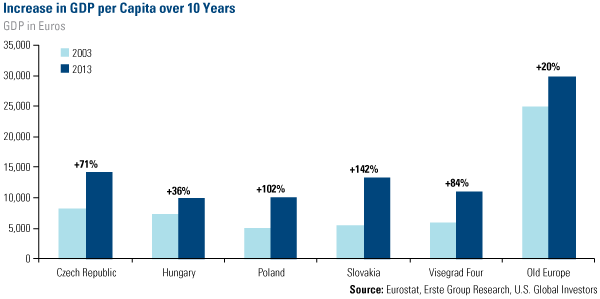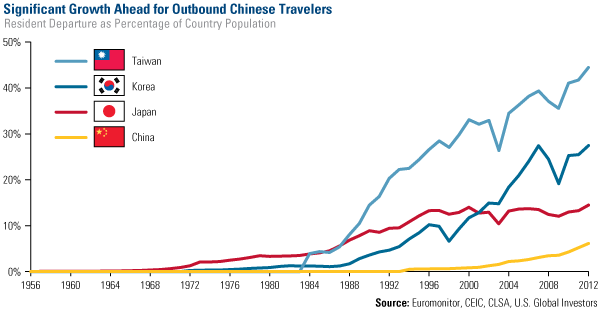Emerging Markets Radar (April 29, 2014)
Strengths
- A report by Erste Group shows European Union (EU) membership has had an overall positive impact on the development and wealth of Eastern European economies; incomes have increased substantially, converging towards their Western peers. The evidence shows that GDP per capita (in euro terms) has more than doubled in Slovakia and Poland since EU membership. In the Czech Republic, the increase has been about 70 percent, but is significantly lower in Hungary at only about 36 percent. Regardless, this growth is still high enough to outpace the old EU, 15-member block, which grew 20 percent over the same period.
- Business activity in the Eurozone has seen growth accelerating in April, with composite flash Purchasing Managers’ Index (PMI) climbing to a 35-month high of 54 from 53.1 in March. Manufacturing PMI increased to 53.3 from 53 and services to 53.1 from 52.2. The eurozone PMI has now been above the 50, no-change level for 10-consecutive months, signaling a continuous expansion of business activity since last July.
- Singapore’s industrial production grew by a much faster-than-expected 12.1 percent year-over-year in March, driven by a 16.4 percent rise in biomedical output and 29.4 percent surge in marine transport and engineering output.
Weaknesses
- China’s Flash HSBC Manufacturing PMI came right in line with market expectations at 48.3 in April. Despite a slight improvement from March’s 48 reading, trends in both new export orders and employment deteriorated.
- Greece's current account deficit widened to 709 million euros in February from a year ago, attributable mainly to an increase in the income account deficit, and more specifically to higher net interest payments on the EFSF and IMF loans. The merchandise trade deficit also widened, which was offset by a widening surplus in the services trade.
- The Hungarian forint capped the biggest weekly drop in three months, after the central bank said it will turn its benchmark two-week bill into a deposit facility. This would be open only to Hungary-based investors to encourage the purchases of more government securities and help cut Hungary’s reliance on external funding. The move highlights a negative aspect of currency weakness, as it threatens the country’s ability to raise financing.
Opportunities
- Although Chinese outbound travel rose a compounded 16 percent per annum from 1994 to 2012, the number of Chinese traveling overseas represents a mere 6 percent of the country’s total population. The 6 percent is versus 15 percent in Japan, 28 percent in South Korea, and 45 percent in Taiwan. Significant growth potential of Chinese tourists overseas should be a favorable long-term driver for casino operators in neighboring Macau and South Korea.
- A potential exclusion of Russia from the MSCI Emerging Europe Index would likely boost Poland and Turkey’s weighting. A study performed by Wood & Co. shows Poland’s weighting would more than double to 39.1 percent, and Turkey’s would rise to 37.2 percent from 17.6 percent. The implications for the two countries are important, since passive MSCI tracking funds will likely buy stocks in these two markets to reflect the new weightings.
- The staff of the International Monetary Fund (IMF) endorsed a $17 billion loan to Ukraine to help the government pay its debts amid a projected economic contraction of 5 percent this year. The IMF loan is expected to clear the way for additional aid from the EU, the U.S. and other donors at a time of escalating tensions between Ukraine and Russia.
Threats
- Tensions between the West and Russia are no longer de-escalating. A BCA Research report argues that the Geneva accord concluded April 17 was a strategic error by the U.S. and Kiev. It put Kiev into an undesirable situation of having to guarantee the disarming of nationalist militias in the West and of relying on Russia to do the same with the separatists in the East.
- Russia’s central bank surprisingly raised its benchmark interest rate after Standard & Poor’s downgraded the nation’s debt for the first time in six years. The rate hike and downgrade could not have come at a worse time; Finance Minister Anton Siluanov’s commented that GDP may not grow at all this year, despite the anemic 1.3 percent growth in 2013, the slowest pace in four years. Similarly, policy makers said in the statement that the probability of inflation exceeding the 5 percent target at the end of 2014 has increased substantially.
- Volatility in Hong Kong-traded Chinese equities may increase going forward because of the overhang associated with potentially rising debt defaults, with the maturity schedule for wealth management products peaking in the second half of this year and no consistent government policy solutions in sight.











